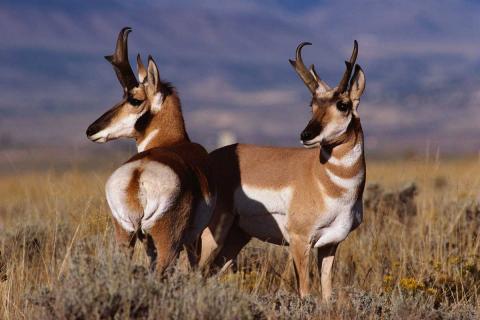Washington State SCI Chapters Work In Coalition To Relocate Pronghorn Antelope
Considered North America’s fastest land animal, the pronghorn antelope has seen growth from zero to approximately 400 in the Yakima area to the Okanogan, thanks to a joint effort between two Indian tribes and local SCI Chapters.
The Yakama Nation has made three translocations totaling 198 pronghorns, starting in 2011. The Colville Confederated Tribes have made two releases, in 2016 and 2017, totaling 150 pronghorns, reported The Lewiston Tribune.
The Washington Department of Fish and Wildlife has not officially supported or opposed the translocations to tribal lands.
The Yakama effort has been funded largely with volunteer support from Washington Chapters of Safari Club International.
A minimum population of about 260 pronghorns was counted in an aerial survey conducted this month by the Yakama Nation, Safari Club and the department, with about 70 found just off the 1.37 million-acre Yakama Indian Reservation, according to the Tribune report.
Pronghorn are native to North America and are abundant in some western states. A 2007 study showed that, while pronghorns once roamed eastern Washington, the populations were never abundant.
Safari Club Chapters started working with the department in 2001 to fund research and provide support for another try at pronghorn reintroduction.
“The clubs became frustrated with all the requirements hobbling the state in advance of a reintroduction,” said Joe Greenhaw of Safari Club’s Seattle-Puget Sound chapter. “When we realized the state just wasn’t going to get it done, we looked for another partner. The Yakama Nation already was looking into it.”
“What stands out about this project is that the state, the Yakama Tribe and a sportsman’s group are all working together, and that’s a big deal,” said Deb Barrett of Naches, past president of the Central Washington Chapter of Safari Club International. Barrett and her husband, Doug, have been involved with organizing six SCI clubs and dealing with the pronghorn project for 18 years.
In 2014, Greenhaw was honored as the department volunteer of the year, largely for his efforts for pronghorns. According to Greenhaw, SCI Chapters have provided funding for state habitat assessments, aerial surveys, translocation costs and GPS collars — nearly $300,000 — since the efforts began in 2001.
“I’ve seen the good years of how much game there was in the ’60s and ’70s in Washington, and I figured it’s time to give back,” Greenhaw said, noting that he wants “conservationist” to be as much of his legacy as being a hunter.
Greenhaw considers hunters and their contributions of time and funding as the backbone of big-game management. It’s the same with the Barretts who were key to organizing volunteers to help Nevada Department of Wildlife capture pronghorns. There, volunteers provided trucks and trailers to rush the animals back to the reservations for release.



